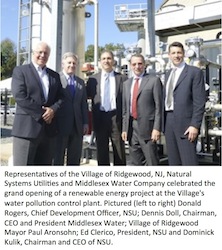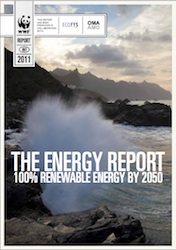A new biogas system designed to optimize the production of electricity from methane has been completed in the Village of Ridgewood, New Jersey. Partners in the project included Natural Systems Utilities (NSU), Middlesex Water Company (MWC) and American Refining and Biochemical (ARB). The biogas project will power the water pollution control plant and reduce its electric demand on the grid, lowering its utility costs.
 “Our public private partnership with NSU, Middlesex and ARB makes Ridgewood a national leader in sustainable municipal wastewater treatment,” said Village of Ridgewood Mayor Paul Aronsohn. “Producing energy at our facilities reduces cost while powering the facility with 100 percent renewable energy provides environmental benefits for the community. To be able to accomplish this at no capital cost to the taxpayer while realizing environmental benefits for the Village is something we can all take pride in.”
“Our public private partnership with NSU, Middlesex and ARB makes Ridgewood a national leader in sustainable municipal wastewater treatment,” said Village of Ridgewood Mayor Paul Aronsohn. “Producing energy at our facilities reduces cost while powering the facility with 100 percent renewable energy provides environmental benefits for the community. To be able to accomplish this at no capital cost to the taxpayer while realizing environmental benefits for the Village is something we can all take pride in.”
NSU, MWC and ARB, through a 20-year partnership with the Village of Ridgewood, made the up-front capital investment in the retrofit that enables the plant, through a new biogas fueled engine generator, to use an anaerobic digestion process to convert methane gas to electricity. In addition, the production of electricity is enhanced when food wastes such as fats, oils and grease are introduced into the process. The heat required for the anaerobic digester is also generated by the biogas, further increasing plant efficiency and reducing emission of greenhouse gases.
This biogas conversion facility now has the ability to capture the energy from methane gas that was previously flared into the atmosphere, and convert it into renewable power. The project also incorporates four solar installations located throughout the Village: Village Hall, the Fire Department, the EMS Building and the Water Control Pollution Facility. Together, enough energy is generated to power the wastewater treatment plant.
“Many municipalities are struggling with aging infrastructure, underperforming utility facilities and severely constrained municipal budgets. This project demonstrates how partnerships with municipal and industrial leaders can achieve a lower carbon footprint while converting wastes to valuable resources for use in the local community. By repurposing an existing facility in this way, everyone benefits — the environment, the Village residents and our renewable energy investors,” said Dominic Kulik, CEO and Chairman, NSU.Read More










